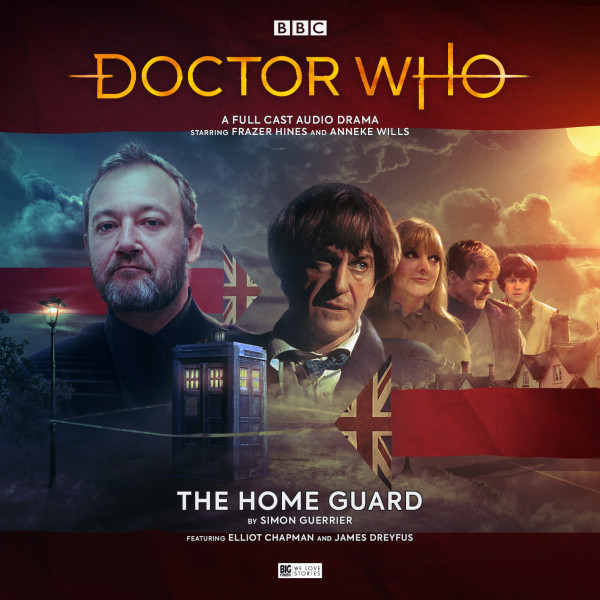We’re
doomed, says Tony.
The black and
white era of Doctor Who has a greater potential for totally tonto mysterious
tomfoolery than the colour era. There, I’ve said it, come at me with your Talons
of Weng Chiang.
I only say this
because The Home Guard by Simon Guerrier is absolutely bonkers in its
initial set-up, and doesn’t get particularly more sane and balanced as events
unfold. But it’s absolutely bonkers in precisely the way Classic Doctor Who
fans will eat up with the biggest sonic spoon in their cutlery drawer.
It’s wartime in
rural England. Jamie and Polly McCrimmon (you’re free to start going doolally
at this point) are in the local Home Guard, the force of domestic anti-terror
designed to repel the Nazis house to house if need be, to stop them conquering
the green and pleasant land. Their friend, Able Seaman Ben Jackson pops by on
leave to see his old…
…Wait…how does
he know them again? Did they…did they travel together or something?
No-one can
quite seem to remember, but anyway, he pops by to visit. The Home Guard is run
by the doddery old doctor whose mind seems to be going, and whose scruffiness
is clearly a sign that he shouldn’t be in command of anything as responsible as
a prescribing pad, let alone the defence of the village from the Nazi hordes.
And the local vicar is a terribly nice, terribly persuasive chap who’s not at
all keen on that doctor…
The thing is,
there are things about a set-up like that which make you think you understand
what’s going on. The Doctor being the leader of the Home Guard is curious, but
it runs vaguely in time with his record of mounting resistance to a bullying
invading force. What the Early Master (yes, damn it, if no-one’s called him
that yet, I’m having it) is doing there, stirring up trouble, re-running
scenarios of invasion against a small village full of Brits is by no means as
straightforward as you might think – of course it isn’t, it’s a Simon Guerrier
script, it’s more or less mandated to be odder than you can initially imagine.
What it
certainly delivers is plenty of neighbour-against-neighbour semi-apocalyptic
tension, akin to anything Big Finish has delivered in the Survivors range,
but also strangely topical in a world where divisions over the likes of Brexit
and Trump have been absorbed down to the bones, in a strange parallel of the
black-and-white realities of England during wartime. When everyone is watching
everyone and loose speech can be fatal at the hands of mob rule (albeit
terribly genteel mob rule), there’s a hair-raising febrile atmosphere in which
to move the elements of a Doctor Who plot around.
I can more or
less guarantee that what’s going on is not what you think is going on. Take
absolutely nothing for granted in a Simon Guerrier script at the best of times.
These are among the best of times, because the reality is mad, the
cliffhangers occasionally shocking, making you wonder if you can even actually
trust the Doctor you think you know, and Dreyfus’ Master is in delicious form,
pitching this first encounter with the Troughton Doctor somewhere between his
diabolical grandiosity in The Destination Wars against David Bradley’s
First Doctor, and the easygoing chicanery of the Delgado incarnation when he
arrives on Earth in Terror of the Autons, with perhaps just a dash of Five
Doctors Ainley to sweeten his snarl. The relationship between he Troughton
trio, Ben, Polly and Jamie is rather more grown-up and complicated here than at
any point on screen, because of the switch-around in what seems the usual order
of things, with Polly and Jamie together and Jamie, allegedly, ‘knowing there
was never anything between us.’ Murky emotional waters – certainly murkier than
would have got on screen in the Sixties, but a great anchoring element for this
science fiction story in human realities.
What actually
is going on, it would be a crime to spoil for you, but it too has a certain
cultural resonance with our day and age, and in particular the notion of a
small group of very particular people, culturally speaking, aiming at
separation, isolation and self-determination. While the atmosphere is a hundred
percent pure black and white era Doctor Who, Guerrier manages to tap into the
worries of our era, creating a story that pleases on many levels at once, while
absolutely doing its job and confusing the bejesus out of listeners in its
first act, only to strive, through action, reaction and eventual necessary
explanation what the hell is actually going on
quite close to the end.
Sign up for The
Home Guard, and it’ll absolutely draw you in with its Dad’s Army-meets-Private-Army
mysteries, its murky sense of imminent threat, its hat-tips to the likes of War
of the Worlds, and its strong performances from the regulars, the guest
cast, and in particular from Hines and Dreyfus as the Doctor and the Master,
not yet as implacably opposed as they would become, but getting there fast in
adventures precisely like this one. It’s mysterious black and white Who in the
best traditions of the era, but with twists that are both timeless and
shockingly relevant to our time.


No comments:
Post a Comment